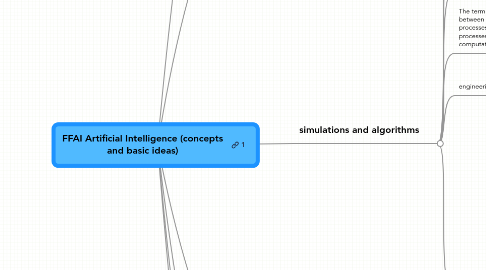
1. kinds of AI
1.1. strong AI
1.1.1. the computer "is human"
1.1.1.1. sapience - it is smart
1.1.1.2. sentience - experiences pain and pleasure
1.1.2. i.e. cyborg (brain in a robot body) and AI (intelligent computer in a robot body) are "the same"
1.1.3. killing it is murder
1.2. weak AI
1.2.1. the computer "acts human"
1.2.1.1. sapience - it is smart
1.2.1.2. no sentience - it doesn't experience pain and pleasure, although it may try to pretend it does
1.2.2. but it may not actually "be" human
1.2.3. it's a "simulation"
2. big ethical implications
2.1. do we have a right to create artificial sentient beings?
2.2. do we have an obligation to create artificial sentient beings?
2.3. do we have an obligation to give sapient beings free will if we can?
2.4. do we have a right to take away free will from sentient beings if it makes them happy? (psychosurgery)
2.5. are sapient beings without sentience dangerous?
2.6. economically, what happens when artificial beings increasingly replace human workers? is that a good or a bad thing?
2.7. is "the singularity" a real risk?
3. list of common objections to AI
3.1. (separate map)
4. a big part of the lectures in the class will be devoted to understanding these arguments better
5. prior disputes in biology, chemistry
5.1. "organic matter is fundamentally different from inorganic matter"
5.1.1. that's why we have "inorganic" and "organic" chemistry
5.1.2. the synthesis of urea, a compound from urine, from inorganic components clearly disproved this
5.2. "living matter is fundamentally different from dead matter" ("life essence", another form of dualism)
5.2.1. no physical evidence
5.2.2. it appears that living systems can be reconstituted from their constituent chemicals
6. simulations and algorithms
6.1. objection to AI: "it's just a simulation"
6.2. what's a simulation?
6.2.1. "imitation of a real-world process by a mental or computational process"
6.2.2. "prediction of outcome or behavior"
6.3. but
6.3.1. physical processes are governed by physical laws and manipulate physical objects
6.3.2. mental processes are information processing
6.3.3. mental processes manipulate symbols and information
6.4. is there a difference between...
6.4.1. implementing an algorithm?
6.4.2. simulating an algorithm?
6.5. The term "simulation" applies to the distinction between physical and computational processes. It doesn't apply to mental processes because they are, in essence computational processes already.
6.6. engineering analog
6.6.1. "Can machines think?"
6.6.2. "Can machines fly?"
6.6.3. "Can machines swim?"
6.7. computational analog
6.7.1. you have an implementation on an IBM 360 (some ancient computer) of quicksort in Fortran
6.7.2. there are 8 possibilities where implementations might agree
6.7.2.1. hardware (+/-)
6.7.2.2. algorithm (+/-)
6.7.2.3. programming language (+/-)
6.7.3. under what conditions can you be said to "simulate" the original algorithm?
6.7.3.1. "simulate/emulate/implement sorting"
6.7.3.2. "simulate/emulate/implement quicksort"
6.7.4. let's work it out...
6.7.5. now assume the machine is hooked up to a simple vision system and robot arm, and it is tasked with physically sorting a bunch of objects by size; internally, it still uses its sorting algorithm
6.7.6. finally, assume that the computer is replaced with a human who can see or not see, and manipulate or not manipulate the objects directly, with the missing capability replaced by communicating with an assistant
6.7.7. under what conditions is the human...
6.7.7.1. simulating/implementing "sorting"
6.7.7.2. simulating/implementing "physical sorting"
6.7.8. finally...
6.7.8.1. replace "sorting" with "reasoning, planning, intelligence"
7. sentience / sapience
7.1. 18th century philosophy made this distinction
7.2. sentience
7.2.1. Sentience is the ability to feel, perceive, or be conscious, or to have subjective experiences. Eighteenth century philosophers used the concept to distinguish the ability to think ("reason") from the ability to feel ("sentience").
7.3. sapience
7.3.1. Sapience is often defined as wisdom, or the ability of an organism or entity to act with appropriate judgment, a mental faculty which is a component of intelligence
7.4. with these definitions
7.4.1. difference between animals and humans?
7.4.2. is AI sentience, sapience, or both?
7.5. legal and moral implications
7.5.1. sentience entails the ability to suffer
7.5.2. there is widely believed to be a legal and moral obligation to prevent suffering if possible
7.6. animal rights
7.6.1. Jerey Bentham: The French have already discovered that the blackness of the skin is no reason why a human being should be abandoned without redress to the caprice of a tormentor. [...] What else is it that should trace the insuperable line? Is it the faculty of reason, or, perhaps, the faculty of discourse? But a full-grown horse or dog is beyond comparison a more rational, as well as a more conversable animal, than an infant of a day, or a week, or even a month, old. But suppose the case were otherwise, what would it avail? The question is not Can they reason? nor, Can they talk? but, Can they suffer?
